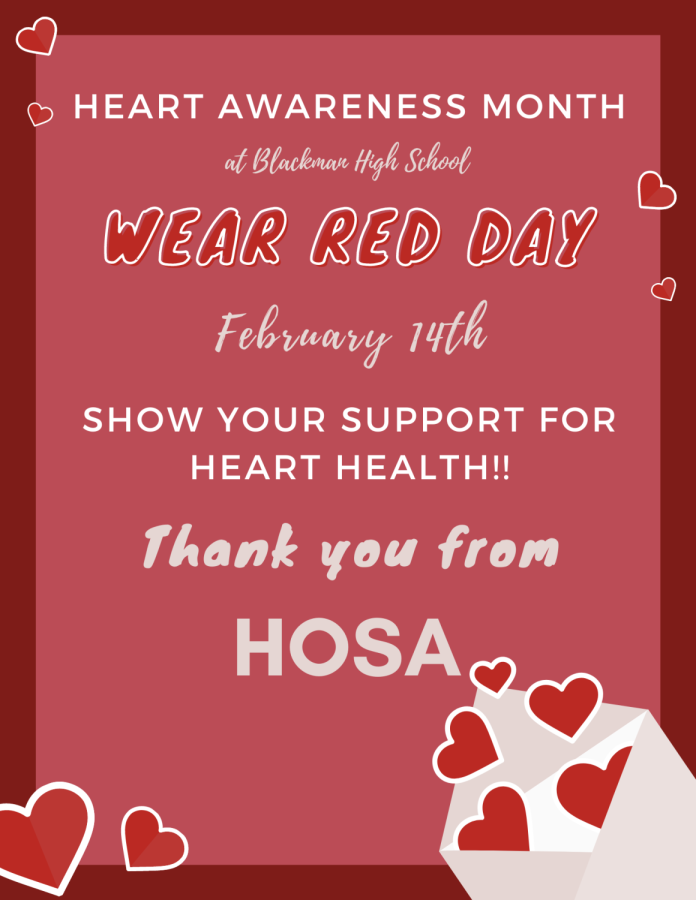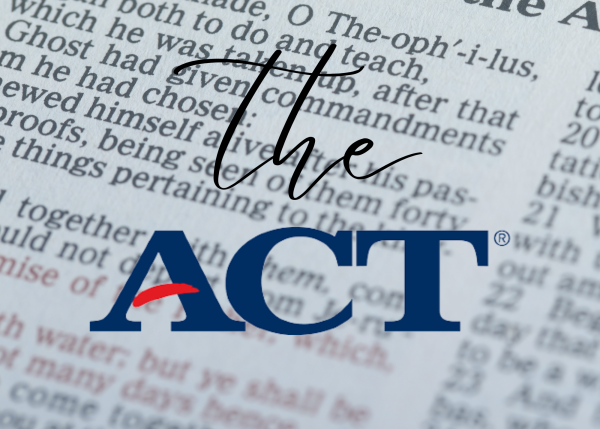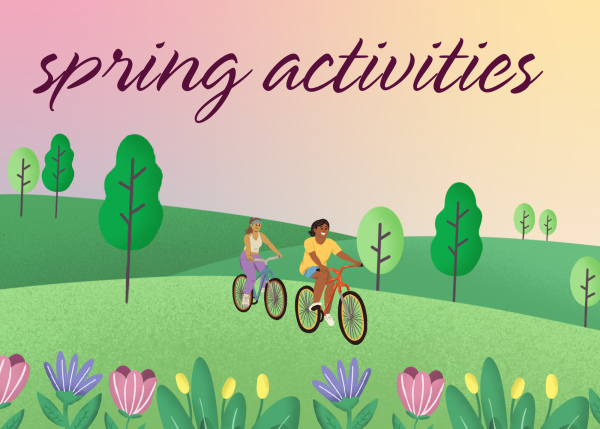Wear Red Day: Help BHS celebrate heart health
BHS is hosting a “Wear Red Day” to support heart health on February 14.
February is Heart Awareness Month. To celebrate Valentine’s Day and all the hearts we love, The Blackman Voice is sharing information about heart-related conditions to help protect your heart.
Here are a few examples of different heart-related diseases and their symptoms:
A heart attack and its symptoms
- High Blood Pressure
- Pain or pressure in the chest
- Pain or discomfort in the arms, back, neck, or jaw
- Shortness of breath
- Nausea
- Light-headedness
Heart Failure and its symptoms
https://www.hopkinsmedicine.org/health/conditions-and-diseases/heart-failure
- Shortness of breath during rest or exercise, or while lying flat
- Weight gain
- Visible swelling of the legs, ankles, and sometimes the abdomen, due to a buildup of fluid
- Fatigue and weakness
- Nausea, abdominal pain, loss of appetite
- Persistent cough that can cause blood-tinged sputum
Heart Valve Disease and its symptoms
https://www.mayoclinic.org/diseases-conditions/heart-valve-disease/symptoms-causes/syc-20353727
- Whooshing sound (heart murmur) when a doctor is listening to the heart with a stethoscope
- Chest pain
- Abdominal swelling (more common with advanced tricuspid regurgitation)
- Fatigue
- Shortness of breath, particularly when active or lying down
- Swelling of your ankles and feet
- Dizziness
- Fainting
- Irregular heartbeat
COVID-19 and how it can affect your heart
The heart inflammation caused by COVID-19 can directly cause myocarditis. Myocarditis is inflammation of the heart muscle that can impact a heart’s ability to pump, leading to hazardous heart rhythms. When someone has this condition, it can be very dangerous to exercise.
Coronary Artery Disease and its symptoms
https://www.cdc.gov/heartdisease/coronary_ad.htm
- Chest pain or discomfort (angina)
- Weakness, light-headedness, nausea (feeling sick to your stomach), or a cold sweat
- Pain or discomfort in the arms or shoulder
- Shortness of breath
Cardiomyopathy and its symptoms
https://www.mayoclinic.org/diseases-conditions/cardiomyopathy/symptoms-causes/syc-20370709
- Breathlessness with activity or even at rest
- Swelling of the legs, ankles, and feet
- Bloating of the abdomen due to fluid buildup
- Cough while lying down
- Difficulty lying flat to sleep
- Fatigue
- Heartbeats that feel rapid, pounding, or fluttering
- Chest discomfort or pressure
Diabetes and how it affects your heart
https://theheartfoundation.org/reducing-your-risk/
More than 80% of diabetes sufferers die of some form of heart or blood vessel disease.
As you can see, a lot of these heart diseases share symptoms. What can you do to keep your heart healthy?
According to heartfoundation.org, we can take care of our hearts in several ways.
- Exercise is an important way of preventing heart problems. Physical activity for at least 30 minutes five days a week or more vigorous workouts for at least 20 minutes three times a week will help protect your heart.
- Adopting a diet low in salt, sugar, and saturated trans fats improves heart health.
- Avoiding smoking and recreational drug use is important because of the damage these activities can do to your heart.
- Consult your physician before any changes to see where your heart health is right now.
- Manage your cholesterol and blood pressure levels.
“Stress, depression, and negative emotions have also been linked to an increased risk of heart disease,” stated heartfoundation.org.
Why does your gender matter?
Women experience many different symptoms compared to men that are often overlooked.
According to www.heart.org, “As with men, women’s most common heart attack symptom is chest pain or discomfort. But women are somewhat more likely than men to experience some of the other common symptoms, particularly shortness of breath, nausea/vomiting and back or jaw pain.”
Women can experience any heart attack without any chest pressure. Also, women tend to pass these symptoms as just normal aging or mistake them for women hormone-related symptoms.
Death rates from heart disease and strokes for women are twice as high as those for all forms of cancer.
Learning more about your heart health and how to keep a healthy lifestyle is beneficial.
A heart-healthy lifestyle can help you avoid heart problems but remember that everyone is different. Be aware of your own heart health!

I am a senior, and my pronouns are she/her. My hobbies include playing guitar, writing, finding new music, shopping, and working as a shift lead at my...

I’m a senior, and my pronouns are she/her. My hobbies include shopping and walking. My favorite movies are Moana and Mulan. I also LOVE lists. My pathway...











